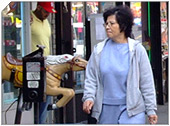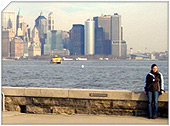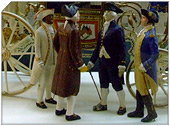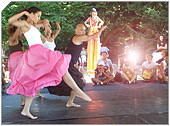Getting Started
Index
NYC Neighborhoods
Manhattan
Brooklyn
Queens
Bronx
Staten Island
NYC Icons
Chrysler Building
Flatiron Building
Empire State Building
Safe NYC
NYPD
FDNY
NYC Weather
NYC Climate
NYC Weather Forecast
Winter Season
Spring Season
Summer Season
Fall Season
NYC History & Politics
New York City History
Tammany Hall and Politics
New York City Politicians
New York City Personalities
Culture of Gotham City
Culture of the city
Cultural diversity
City in popular culture
|
Herbert John "Jackie" Gleason (February 26, 1916 - June 24, 1987) was an American comedian, actor, and musician.
One of the most popular stars of early television, Gleason was respected for both comedic and dramatic roles. However, his major legacy is a brash visual and verbal comedy, especially as delivered as the character Ralph Kramden on the pioneering sitcom The Honeymooners.
Biography
One of two sons of a father who abandoned the family (a brother died when Jackie was a boy), Gleason was raised by a loving but troubled, overworked mother who died when he was 19. (Gleason sometimes pushed the date of death back three years; biographer William A. Henry III wrote of Gleason's tendency to both exaggerate and obscure his hardscrabble childhood.) His first recognition as an entertainer came on Broadway, when he appeared in Follow the Girls.
By the 1940s, Gleason was in the movies, first at Warner Brothers as "Jackie C. Gleason" in such films as Navy Blues with Ann Sheridan and Martha Raye, and All Through the Night with Humphrey Bogart; then at Columbia Pictures for the B military comedy Tramp, Tramp, Tramp; and finally at Twentieth Century-Fox (Gleason played the Glenn Miller band's bassist in Orchestra Wives).
But Gleason-whom Orson Welles in due course tagged "The Great One"-didn't make a strong impression in Hollywood at first. At the same time, he developed a well-enough liked nightclub act which included both comedy and music. He also became somewhat known for hosting all-night parties-swapping stories, flanked by attractive women-at his hotel suite. "Anyone who knew Jackie Gleason in the 1940s," wrote CBS historian Robert Metz, "would tell you The Fat Man would never make it. His pals at Lindy's watched him spend money as fast as he soaked up the booze." Metz also noted the legend that held Gleason one night hiring a full orchestra just to keep him company. Henry has written that Gleason had a reputation as a paradox even then: a man who could be excessively generous one moment and excessively cruel the next.
Throughout the 1950s and '60s, Gleason enjoyed a secondary music career, lending his name to a series of best-selling "mood music" albums with jazz overtones for Capitol Records. Gleason felt there was a ready market for romantic instrumentals. He recalled seeing Clark Gable play love scenes in movies, and the romance was, in his words, "magnified a thousand percent" by background music. Gleason reasoned, "If Gable needs music, a guy in Brooklyn must be desperate!"
Gleason could not read or write music in a conventional sense; he was said to have conceived melodies in his head and described them vocally to staff help. He did likewise with the well-remembered themes of both The Jackie Gleason Show ("Melancholy Serenade") and The Honeymooners ("You're My Greatest Love"). There has been some controversy over the years as to how much credit Gleason should have received for the finished products; Henry has written that beyond the possible conceptualizing of many of the songs, Gleason had no direct involvement such as conducting in the making of these recordings.
Some of that music turns up once in awhile today. "It's Such a Happy Day", which often turned up as a theme behind numerous Gleason television sketches, was used as background music for a jaunty scene involving heart transplant recipient Minnie Driver bicycling around her Chicago neighborhood in the 2000 romantic comedy Return to Me.
Nothing in Common proved to be Gleason's final film role. A six-pack a day smoker for years, he was fighting colon cancer and liver cancer even while he worked on the film. He was hospitalised at one point in 1986-87 but checked himself out and died quietly at age 71 at his Inverrary home. In the same year, Miami Beach honored his contributions to the city and its tourism by renaming the Miami Beach Auditorium-where he had done his television show once moving to Florida-as the Jackie Gleason Theater of the Performing Arts. Jackie Gleason is interred in an outdoor mausoleum at Our Lady of Mercy Catholic Cemetery in Miami, Florida. Below the graceful Roman columns, at the base, is the inscription "And Away We Go."
|
New York City Search
Quick NYC
|



 New York Weather Forecast
New York Weather Forecast
 Ethnic composition
Ethnic composition


















